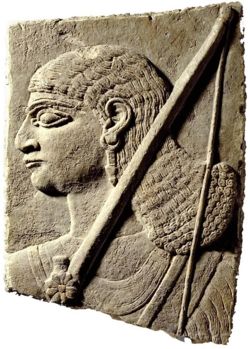Assyrian Empire
 From Conservapedia
From Conservapedia - For Modern Assyrians, see Assyrians
Assyria was a very ancient kingdom in northern Mesopotamia. Today that would be in northern Iraq.
It was dependent on Babylonia for a while, but rose to become an independent state in the 14th century B.C. Beginning with the 12th century it declined, only to reemerge as a kingdom again in the 8th century B.C. Under a sequence of powerful Assyrian kings of Tiglath-pileser III, Shalmaneser V, Sargon II, Sennacherib, Esarhaddon and Asurbanipal Assyria expanded by force and controlled most of the Middle East from Egypt to the Persian Gulf.
The Assyrians were known for their cruelty and military skills, and more than a few references in the Bible lament their treatment of the Hebrews. The Old Testament mentions “Assyria” 119 times, including this typical verse: “The Lord was with him; wherever he went, he prospered. He rebelled against the king of Assyria and would not serve him.” (II Kings 18:7 (NRSV))
The Assyrians conquered Samaria, the northern kingdom of Israel, in 722 B.C., but Judah remained free. In 733-732 Tiglath-pileser III exiled the northern and eastern tribes (Naphtali, Dan, Gad, Reuben, the half-tribe of Manasseh).
The Assyrian Empire declined quickly when a simultaneous revolt of Babylon and Media occurred in 625 B.C. A people who ruled through terror, they had no loyal allies when it looked like they could be overthrown. Nineveh, the capital of Assyria, was taken in 612 B.C. and razed to the ground. Fighting continued through 609 B.C. and for a few years the Assyrian general Ashur-uballit tried to save a remnant of the Empire with Harran as its capital, but that last gasp was destroyed in 605 B.C. The Babylonians quickly assumed prominence in the Middle East as the next great Empire as they began their own military campaigns.
Assyrian chronology is anchored to the solar eclipse mentioned in the eponym of Bar-Sagale, determined by archaoastronomy to be June 15/16, 763 BC.[1]
Notable Assyrian Rulers[edit]
- Tiglath-pilesar I — 1114 to 1076 B.C.
- Adad-nirari II — 911 to 891 B.C.
- Tukulti-ninurta II — 890 to 844 B.C.
- Ashurnasirpal II — 883 to 859 B.C.
- Shalmaneser III — 859 to 824 B.C.
- Shamshi-Adad V — 824 to 810 B.C.
- Semiramis — 810 to 806 B.C. (Widow of Shamshi-Adad V)
- Adad-nirari III — 806 to 782 B.C. (Son of Semiramis)
- Shalmaneser IV — 782 to 773 B.C.
- Ashur-dan III — 772 to 755 B.C.
- Ashur-nerari V — 754 to 745 B.C.
- Tiglath-pileser III — 745 to 727 B.C.
- Shalmaneser V — 727 to 722 B.C.
- Sargon II — 722 to 705 B.C.
- Sennacherib — 705 to 681 B.C.
- Esarhaddon — 681 to 668 B.C.
- Ashurbanipal — 668 to 627 B.C.
- Ashur-etel-ilani — 627? to 623? B.C.
- (Final rapid disintegration 625 to 612 B.C., destroyed for good in 605 B.C.)
See also[edit]
References[edit]
- ↑ The eponyms of the Assyrian empire 910-612 BC. by A. R. Millard, Robert M. Whiting. State Archives of Assyria, Vol. 2. Helsinki: Neo-Assyrian Text Corpus Project, 1994.
External links[edit]
- Ancient records of Assyria and Babylonia. U. of Chicago Press, 1926. By Luсkenbill D.D. (online) [1]
Categories: [Ancient History] [Assyria]
↧ Download as ZWI file | Last modified: 02/20/2023 03:00:22 | 62 views
☰ Source: https://www.conservapedia.com/Assyrian_Empire | License: CC BY-SA 3.0
 ZWI signed:
ZWI signed:

 KSF
KSF